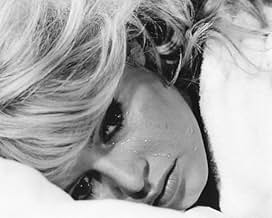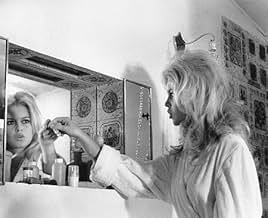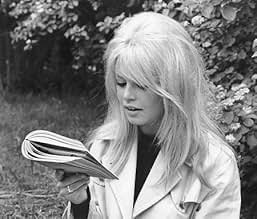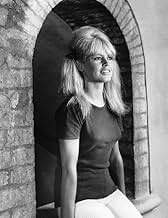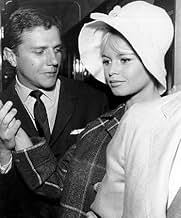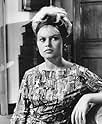Vie privée
- 1962
- 1h 43m
IMDb RATING
5.6/10
1.3K
YOUR RATING
When Jill becomes a movie star she soon discovers that her private life is destroyed by persistent fans that won't leave her alone. Her mother's ex-lover, Fabio, tries to protect her.When Jill becomes a movie star she soon discovers that her private life is destroyed by persistent fans that won't leave her alone. Her mother's ex-lover, Fabio, tries to protect her.When Jill becomes a movie star she soon discovers that her private life is destroyed by persistent fans that won't leave her alone. Her mother's ex-lover, Fabio, tries to protect her.
- Director
- Writers
- Stars
Paul Sorèze
- Maxime
- (as Paul Soreze)
Eléonore Hirt
- Cécile
- (as Eleonore Hirt)
Jeanne Allard
- La femme de ménage
- (uncredited)
Paul Apoteker
- Le caméraman
- (uncredited)
Jean-Claude Brialy
- Le narrateur
- (voice)
- (uncredited)
Claude Day
- L'éditeur
- (uncredited)
Christian de Tillière
- Albert
- (uncredited)
- Director
- Writers
- All cast & crew
- Production, box office & more at IMDbPro
Featured reviews
After having seen Louis Malle "Crackers", we thought the director might have bad luck with that film, but viewing "Vie Privee", his 1962 effort that deals with fame and being in the limelight, one wonders what did attract him to get involved in this project. Granted, the dubbed English version that was presented recently on cable hasn't kept well and the translated dialog is horrible. The director collaborated with Jean Paul Rappeneau and Jean Ferry in the screen play, which might have made more sense in the original version that what it does in the one we saw.
The story about the beautiful Jill, who at first is seen as wanting to be a ballerina, changes without any explanation as this young woman is "discovered" for the movies, something that even for France, never occurs in such a quick fashion, and we can't buy it. Then at the pinnacle of her fame, Jill is thrown into despair as she can't cope with the invading horde of paparazzi that hound her and don't let her live a normal life. Jill runs back home to Geneva to be with her mother and then she turns into Fabio, who was seeing her best friend.
The film is tedious, at best. Marcello Mastroianni and Brigitte Bardot appear to be going through the motions, but actually there is no chemistry between them. These two attractive stars seem to have been cast just for their allure to fans, but actually they never connect.
The story about the beautiful Jill, who at first is seen as wanting to be a ballerina, changes without any explanation as this young woman is "discovered" for the movies, something that even for France, never occurs in such a quick fashion, and we can't buy it. Then at the pinnacle of her fame, Jill is thrown into despair as she can't cope with the invading horde of paparazzi that hound her and don't let her live a normal life. Jill runs back home to Geneva to be with her mother and then she turns into Fabio, who was seeing her best friend.
The film is tedious, at best. Marcello Mastroianni and Brigitte Bardot appear to be going through the motions, but actually there is no chemistry between them. These two attractive stars seem to have been cast just for their allure to fans, but actually they never connect.
Reviewers have suggested that this is not among the best of Malle's output and that the two principals lack the fire of real heterosexual passion.
The second objection is perfectly right, because Jill seems incapable of a grown-up relationship with a man, just as she seems incapable of pursuing any worthwhile career beyond that of international sex-symbol. Being highly desirable and readily available may be huge fun in your teens and early twenties but does not lead to a fulfilling existence. Her trajectory is tragic, beauty that offers not life but a hollow illusion of life.
While Fabio cannot resist what he finds in his bed (few straight men could), his feelings for Jill seem more pity than lust. He wants to protect her from endless exploitation by others and from her own immaturity. But, having gained an international reputation for the magazine he edits and the play he is producing, he is not going to sacrifice his hard-won status for a bimbo. He is creative, adding to the world's culture, while she is merely decorative.
A relationship between two characters like this will be short of fire, and it would be Hollywoodian falsity to pretend that they are merely consumed with passion for each other.
As for the place of this piece in Malle's very varied body of work, his non-documentary dramas differ widely from each other with few overt links. Here one has to consider his own evolution: an artist's fourth picture made at age 30 does not compare with a mature and reflective masterpiece like "Au revoir les enfants" made at age 55. Films appreciated in Europe can be lost in America, particularly if mutilated by tone-deaf dubbing and puritanical cutting. Also, I would suggest, we might separate films set in the past or an imaginary future from films set in and therefore commenting on the present.
To show the real superstar Brigitte Bardot as a fictional empty superstar, virtually playing herself (compared with her more nuanced rôle for Godard a year later in "Le Mépris"), is satirical, poignant, and even, dare I say it, darkly comic. If you don't get the joke, though many would have in 1962, you may not rate the film highly.
The second objection is perfectly right, because Jill seems incapable of a grown-up relationship with a man, just as she seems incapable of pursuing any worthwhile career beyond that of international sex-symbol. Being highly desirable and readily available may be huge fun in your teens and early twenties but does not lead to a fulfilling existence. Her trajectory is tragic, beauty that offers not life but a hollow illusion of life.
While Fabio cannot resist what he finds in his bed (few straight men could), his feelings for Jill seem more pity than lust. He wants to protect her from endless exploitation by others and from her own immaturity. But, having gained an international reputation for the magazine he edits and the play he is producing, he is not going to sacrifice his hard-won status for a bimbo. He is creative, adding to the world's culture, while she is merely decorative.
A relationship between two characters like this will be short of fire, and it would be Hollywoodian falsity to pretend that they are merely consumed with passion for each other.
As for the place of this piece in Malle's very varied body of work, his non-documentary dramas differ widely from each other with few overt links. Here one has to consider his own evolution: an artist's fourth picture made at age 30 does not compare with a mature and reflective masterpiece like "Au revoir les enfants" made at age 55. Films appreciated in Europe can be lost in America, particularly if mutilated by tone-deaf dubbing and puritanical cutting. Also, I would suggest, we might separate films set in the past or an imaginary future from films set in and therefore commenting on the present.
To show the real superstar Brigitte Bardot as a fictional empty superstar, virtually playing herself (compared with her more nuanced rôle for Godard a year later in "Le Mépris"), is satirical, poignant, and even, dare I say it, darkly comic. If you don't get the joke, though many would have in 1962, you may not rate the film highly.
It was the dubbed version that I saw of this dreary little story about an actress (BB) who finds out, as is almost always the way, that her internal happiness is a sacrificial lamb to fame. Certainly good-looking - with La Bardot at her most luscious how could it not be? - but never very compelling.
The ending is, however, notable for going waaaaaay over the top. (Has anyone noticed how many Brigitte Bardot movies have unhappy endings?)
The ending is, however, notable for going waaaaaay over the top. (Has anyone noticed how many Brigitte Bardot movies have unhappy endings?)
In 1961,BB was the biggest star France had ever had.Never in the history of French cinema an actress had crystallized around her such an adulation..but also so much hatred.One scene sums up everything;in an elevator ,Jill (BB) meets a cleaning lady who insults her,calls her whore and tells her that while she is playing around,her brother is fighting in Algeria.This woman of the people epitomizes what a lot of common men used to think circa 1960.Like in Clouzot's "la vérité" ,as an user wrote,the people is judging Bardot.
"Vie privée" is looked upon as one of Louis Malle's weakest efforts and it's probably unfair.He did much worse later ("le souffle au coeur"(1971).Its hints at Bardot's own life seem dated now but they inspire its vital extremism:Jill (BB) becomes a big star and it's a hellish life which begins.The scene when Jill is tracked down in her own house by journalists is barely fiction:in her memoirs,BB tells that German tourists' tour in Saint-Tropez included her house's visit!!The movie has two parts;the first one is the rise of the star and her efforts to escape from the maddening crowd:Louis Malle uses too much voice over,and a telegraphic style,très nouvelle vague.The second part depicts her relationship with a handsome Italian (Mastroianni),but even in a foreign country she's got to hide in a bedroom.The movie turns a bit pretentious ,with pompous music -from an opera Mastroianni is directing-;and after the rise,comes the fall (in every sense of the term).
BB was never a bimbo (une ravissante idiote) but a clever sensitive woman.We feel it in Malle's work.Watch it for her.
"Vie privée" is looked upon as one of Louis Malle's weakest efforts and it's probably unfair.He did much worse later ("le souffle au coeur"(1971).Its hints at Bardot's own life seem dated now but they inspire its vital extremism:Jill (BB) becomes a big star and it's a hellish life which begins.The scene when Jill is tracked down in her own house by journalists is barely fiction:in her memoirs,BB tells that German tourists' tour in Saint-Tropez included her house's visit!!The movie has two parts;the first one is the rise of the star and her efforts to escape from the maddening crowd:Louis Malle uses too much voice over,and a telegraphic style,très nouvelle vague.The second part depicts her relationship with a handsome Italian (Mastroianni),but even in a foreign country she's got to hide in a bedroom.The movie turns a bit pretentious ,with pompous music -from an opera Mastroianni is directing-;and after the rise,comes the fall (in every sense of the term).
BB was never a bimbo (une ravissante idiote) but a clever sensitive woman.We feel it in Malle's work.Watch it for her.
Another reviewer mentioned nouvelle vague and it's true this film stinks of French New Wave. Of course the time was really the style's zenith when even boring pretentious garbage was treated like great art. Hard to take is the acting style that seems to come with the movement -very flat and anti-emotional - a little too Neo-realist for most tastes especially in America where actors tend to chew the scenery. Heck Tom Cruise apparently chews the scenery in ordinary life or at least on talk shows.
However I found there was a kind of chemistry and disturbing reality in Bardot's portrayal of the sex kitten. She was one moment almost catatonic and another bubbly. But how contemporary to see the star as a kind of trapped animal like a fox with dogs and hunters in pursuit. One could see this movie being remade with Brittany or another of the modern celebutantes in the starring role. Was Bardot playing herself? Well isn't that the kind of truth we look for in art? Malle could have been alluding to Marilyn or any modern celebrity caught in the maelstrom of fame. The relationship with Mastroanni seemed especially perceptive. He wants to protect her, but she wants to live and she can't. Certainly think Brittney could relate to this one especially to Jill's own mother selling her out to the press. We've seen that one lately, haven't we.
Not a fun movie but one that stays with you and that's rare these days.
However I found there was a kind of chemistry and disturbing reality in Bardot's portrayal of the sex kitten. She was one moment almost catatonic and another bubbly. But how contemporary to see the star as a kind of trapped animal like a fox with dogs and hunters in pursuit. One could see this movie being remade with Brittany or another of the modern celebutantes in the starring role. Was Bardot playing herself? Well isn't that the kind of truth we look for in art? Malle could have been alluding to Marilyn or any modern celebrity caught in the maelstrom of fame. The relationship with Mastroanni seemed especially perceptive. He wants to protect her, but she wants to live and she can't. Certainly think Brittney could relate to this one especially to Jill's own mother selling her out to the press. We've seen that one lately, haven't we.
Not a fun movie but one that stays with you and that's rare these days.
Did you know
- TriviaFrench actor Michel Auclair dubs Marcello Mastroianni's voice in French.
- ConnectionsFeatured in Censura: Alguns Cortes (1999)
- SoundtracksSidonie
Music by Jean-Max Rivière and Giannis Spanos
Lyrics by Charles Cros
Performed by Brigitte Bardot
- How long is A Very Private Affair?Powered by Alexa
Details
- Runtime
- 1h 43m(103 min)
- Aspect ratio
- 1.85 : 1
Contribute to this page
Suggest an edit or add missing content


